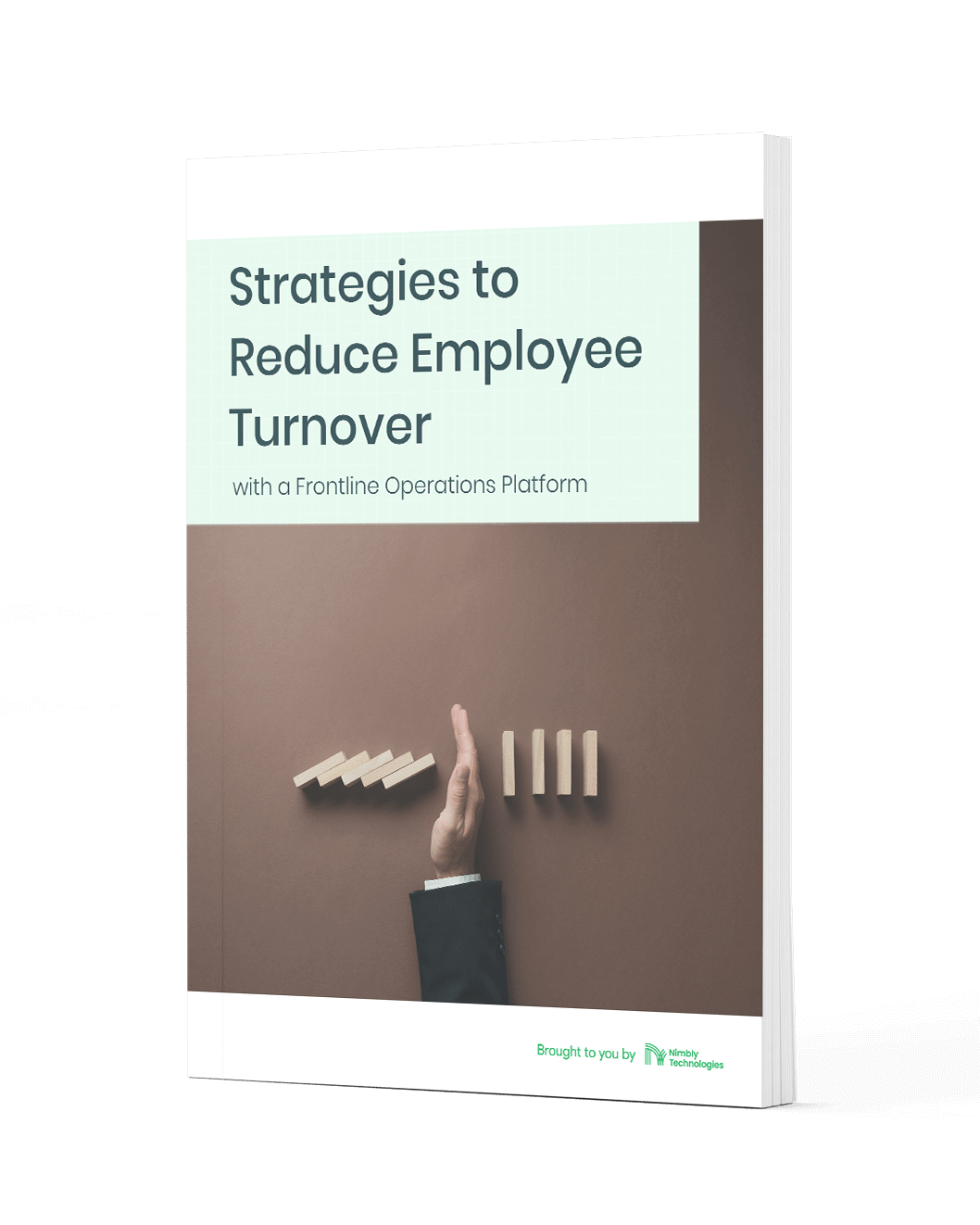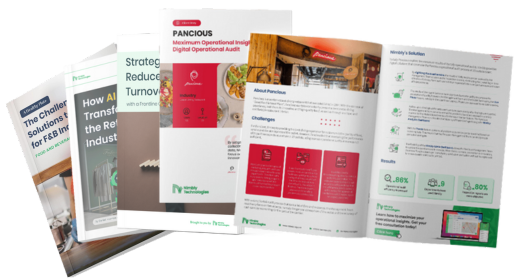

In the fast-paced world of retail and F&B, operations managers face a unique set of challenges that can make or break their businesses. From juggling multiple responsibilities to staying ahead of changing trends, the road to success is paved with obstacles.
But fear not, because in this comprehensive guide, we'll delve into the top 10 challenges faced by operations managers in the retail and F&B industries and provide actionable strategies for overcoming them. Whether you're managing a chain of restaurants or a network of retail stores, this article is your roadmap to operational excellence. So let's dive in!

As an operations manager in the dynamic world of F&B and retail, you're tasked with managing a multitude of responsibilities, from sales matters to human resources. This diverse range of duties can indeed be overwhelming at times.
To address this challenge effectively, it's crucial to maintain a deep understanding of the happenings across all departments, foster open communication channels, and be prepared to take decisive action when necessary.
For instance, consider a scenario where you're overseeing a chain of retail stores. Your responsibilities span inventory management, customer service, and more. By staying well-informed about inventory levels, sales trends, and customer feedback across all locations, you can proactively address any issues that arise.
Additionally, fostering transparent communication among team members ensures that everyone is aligned with the overarching goals and can collaborate seamlessly to maintain smooth operations. As your company expands and your teams grow larger, you may find it necessary to utilize digital technology, such as case management systems, to monitor issues across all your stores accurately and take swift, decisive action.

Staying compliant with industry regulations and safety standards is paramount but can pose significant challenges. These standards often evolve, requiring constant vigilance and adaptation to ensure adherence. To navigate this challenge effectively, operations managers must invest in comprehensive training programs tailored to keep employees informed about the latest regulations and safety protocols.
Additionally, leveraging technology solutions such as digital checklists and monitoring systems can streamline compliance efforts, enabling real-time tracking of adherence and facilitating prompt corrective actions when necessary. Prioritizing safety protocols across all operational aspects, from food handling procedures in restaurants to product display regulations in retail stores, is essential for maintaining compliance and ensuring the well-being of customers and employees alike.
For instance, in a restaurant setting, diligent training on food safety practices and regular audits using digital tools can help mitigate risks and uphold compliance with stringent health and safety standards.
Embracing new technologies is crucial for F&B and retail operations to stay competitive. However, navigating this transition can be daunting, presenting challenges such as staff resistance, technical glitches, and workflow disruptions.
To overcome this challenge, it's essential to adopt a gradual approach to implementing new technologies. Start by providing comprehensive training to your staff, ensuring they understand the purpose and functionality of the new tools. Encourage open communication and feedback channels to address any concerns or challenges encountered during the transition process.
For instance, suppose your F&B or retail company decides to adopt a new inventory management system to streamline operations and improve efficiency. In this case, you would initiate the transition by conducting thorough training sessions for all staff members involved in inventory management.
During these training sessions, employees would receive hands-on instruction on how to use the new system effectively. Additionally, feedback mechanisms would be put in place to allow employees to voice any concerns or difficulties they encounter during the training process.
By taking a gradual approach and prioritizing comprehensive training and feedback, your F&B or retail operation can successfully embrace new technologies while minimizing disruptions and ensuring a smooth transition for your team.
Managing teams across multiple F&B and retail locations presents unique challenges, especially with the rise of remote work. To overcome this hurdle, it's crucial to leverage collaboration tools tailored to your industry, establish clear communication channels, and prioritize regular check-ins to ensure everyone remains aligned and productive.
For example, imagine you're overseeing a chain of restaurants spanning several locations. With kitchen staff, servers, and managers spread across different sites, effective communication is key to maintaining operational efficiency. By implementing collaboration tools such as Nimbly Digital Routine or task management apps, you can streamline communication, delegate tasks, and ensure everyone is on the same page.
By embracing collaboration tools, establishing clear communication channels, and prioritizing regular check-ins, F&B and retail operations managers can effectively manage teams across multiple locations and overcome the challenges associated with remote work.
Managing inventory across multiple locations in the dynamic environments of F&B and retail operations poses a significant challenge. The complexity arises from the need to balance stock levels to avoid overstocking, which ties up capital and increases the risk of spoilage or obsolescence, while also preventing stockouts that result in lost sales and dissatisfied customers.
To tackle this challenge effectively, operations managers can implement robust inventory management strategies tailored to the unique needs of their business. Utilizing advanced inventory management software is paramount, as it provides real-time visibility into stock levels across all locations, streamlining the inventory tracking process. Regular audits should also be conducted to ensure data accuracy and identify discrepancies promptly.
Additionally, optimizing stock levels based on demand patterns and sales forecasts is essential. By analyzing historical sales data and market trends, operations managers can fine-tune replenishment schedules and adjust inventory levels accordingly. This proactive approach minimizes the likelihood of stockouts during peak demand periods while minimizing excess inventory during slower periods.
Consider a bustling retail chain with multiple stores across the region. To maintain optimal inventory levels and prevent stockouts, the operations manager implements a comprehensive inventory management solution. By leveraging sophisticated software equipped with features such as automated replenishment and demand forecasting, the manager gains actionable insights into inventory performance in real-time.
Regular audits are conducted to verify inventory accuracy and address any discrepancies promptly. By optimizing stock levels based on historical sales data and seasonal trends, the retail chain effectively manages inventory across all locations. As a result, stockouts are minimized, ensuring that customers can always find their desired products on the shelves.

Providing exceptional customer service is paramount in both the F&B and retail industries, yet maintaining consistency can pose significant challenges. To overcome this hurdle, operations managers must invest heavily in comprehensive training programs tailored to their specific business needs. By equipping employees with the necessary knowledge and skills, they can ensure that every customer interaction exceeds expectations.

Furthermore, actively gathering feedback from customers and employees alike is essential for identifying areas for improvement and refining service standards. Implementing robust feedback mechanisms, such as suggestion boxes or digital surveys, allows operations managers to gain valuable insights into customer preferences and concerns.
Empowering frontline staff to take ownership of customer interactions is another key strategy for delivering consistent service excellence. By providing employees with the authority to resolve issues autonomously and encouraging them to go above and beyond to meet customer needs, operations managers can instill a culture of customer-centricity throughout the organization.
For example, imagine you run a bustling cafe known for its friendly atmosphere and prompt service. By investing in comprehensive training for your baristas and waitstaff, actively soliciting feedback from customers through comment cards or online reviews, and empowering your team to proactively address any issues that arise, you can ensure that every guest leaves satisfied and eager to return.
Also read: How Voice of Customer can help Brand Experience

Finding and retaining top talent is paramount for your success, yet it poses significant challenges in today's competitive job market. With turnover rates on the rise and the need for skilled employees more critical than ever, businesses must implement strategies to attract and retain the best talent.
To address this challenge, businesses can offer comprehensive training and growth opportunities tailored to the specific needs of their employees. Investing in continuous learning not only enhances the skills and knowledge of existing team members but also demonstrates a commitment to their professional development. Additionally, providing mentorship programs allows employees to learn from experienced colleagues, fostering growth and skill development.
Creating a positive work culture is also essential in attracting and retaining top talent. A supportive and inclusive work environment, where employees feel valued and appreciated, can significantly impact employee satisfaction and retention rates. Encouraging open communication, recognizing achievements, and fostering a sense of belonging can contribute to a positive workplace culture.
For example, suppose you're looking to hire new team members for your restaurant chain. In that case, offering comprehensive training programs that cover everything from customer service skills to food safety protocols can attract candidates looking to develop their skills and advance their careers. Additionally, implementing mentorship programs pairing new hires with experienced staff members can provide invaluable support and guidance as they acclimate to their roles.
By prioritizing training and growth opportunities and cultivating a positive work culture, F&B and retail operations can successfully attract and retain top talent, ensuring long-term success and sustainability in today's competitive market.

Balancing short-term goals with long-term sustainability is a critical challenge for F&B and retail operations. It's essential to develop a clear strategy that not only drives immediate results but also ensures the long-term viability of the business. Prioritizing sustainability initiatives, such as reducing waste, conserving energy, and sourcing ethically, can help achieve this balance.
Also read: How Digital Checklist can Reduce Restaurant Food Waste
For instance, consider a restaurant chain aiming to expand its operations while minimizing its environmental footprint. By implementing initiatives like composting food waste, switching to energy-efficient appliances, and sourcing ingredients locally, the chain can reduce its environmental impact while still achieving growth objectives.
Engaging stakeholders, including employees, suppliers, and customers, is also crucial in this endeavor. By fostering a culture of sustainability throughout the organization and soliciting feedback from stakeholders, F&B and retail operations can ensure that their growth strategies align with broader environmental and social goals.
Change is not just constant; it's exponential. From evolving consumer preferences to emerging technologies, staying ahead of the curve is crucial for survival. However, this poses a significant challenge for operations managers who must navigate these changes while ensuring seamless operations across multiple locations.
To tackle this challenge, operations managers need to foster a culture of adaptability within their teams. This involves encouraging open communication channels where employees feel empowered to voice their ideas and concerns. Additionally, embracing new opportunities and technologies is essential for staying relevant in a rapidly evolving market.
Imagine you're managing a chain of retail stores in a bustling city center. With the rise of e-commerce and changing consumer behaviors, foot traffic in your stores has started to decline. Instead of viewing this as a setback, you decide to embrace the shift towards online shopping. By investing in an e-commerce platform and implementing click-and-collect services, you not only adapt to the changing landscape but also tap into new revenue streams. As a result, your stores remain competitive in the market, and your team feels empowered to embrace change rather than fear it.
Also read: 7 Retail Trends To Look Out For in 2024
Mastering operations management isn't easy, but by tackling these challenges head-on and embracing opportunities for growth, you can set your business up for success in today's ever-changing landscape. Unlock the full potential of your operations with the expertise of the Nimbly team.
